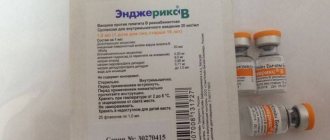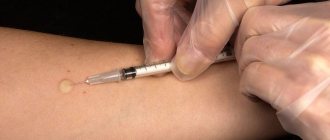Tetanus is an infectious pathology that poses a serious problem for global health. The disease is caused by the highly toxic rod-shaped bacterium C.tetani with frequent fatal outcomes. Pathology can only be prevented by vaccination.
To ensure that immunization has the best results with minimal negative consequences, a tetanus vaccination schedule has been developed. The main emphasis is on vaccination of newborns and young children.
Is it included in the National Calendar?
Tetanus vaccination is mandatory and is included in the National Calendar. This is a special document that indicates the combination and sequence of vaccinations for both young patients and the adult population. You can get acquainted with the vaccination calendar from a pediatrician or infectious disease specialist.
When deciding to get vaccinated, you should also remember the legal regulations adopted in our country:
- Vaccination is a voluntary event. There is no penalty for refusing this procedure. But, having made such a decision, parents must understand that all responsibility for the future health of the baby will fall on them;
- any immunization should be carried out in specialized organizations - clinics or licensed private medical centers;
- Vaccination is carried out only by personnel who have special clearance and only with drugs approved for use.
The connection between wounds and tetanus has been noted since ancient times. And the clinical picture of the disease was first described by Hippocrates: his son died from this infection. The scientific study of pathology began in the 19th century, when the Russian surgeon N. Monastyrsky discovered the causative agent of tetanus. This happened in 1883.
And 7 years later, the Japanese microbiologist Kitasato managed to isolate tetanus toxin and, together with E. Behring (German bacteriologist), created an antitetanus serum. The toxoid used in tetanus vaccination today was developed in 1923 by Gaston Ramon, the great French immunologist.
List of mandatory vaccinations
The first thing to note is that a child can be vaccinated only after the parents have signed a paper called “informed voluntary consent to medical intervention.” Mom and dad must sign each time they plan to vaccinate.
According to the latest amendments to the law, children are not prohibited from attending kindergarten or school if their parents have not given their consent to vaccination. A ban is possible only in the event of the emergence of mass infectious diseases or the threat of epidemics.
Please note that the mandatory vaccination calendar includes a huge list of such infections and viruses:
- Hepatitis B . The pathology affects the liver (with a chronic course, cirrhosis gradually develops). This virus is resistant to negative environmental conditions. Transmitted by hematogenous route;
- tuberculosis . This is an infectious disease that affects lung tissue. The causative agent of the disease is Mycobacterium tuberculosis. The disease is transmitted by airborne droplets during a conversation with a patient, as well as when he coughs or sneezes;
- polio . This is an infectious pathology that is provoked by a virus. The latter leads to progression of paralysis and disability for the rest of life;
- diphtheria . The disease affects the respiratory system, as well as the heart and blood vessels. As a result of infection, the nervous system suffers. Later, the organs of the excretory system are also affected. It is important to note that before the advent of a vaccine against this pathology, those who became ill with the disease died;
- whooping cough This is an acute disease (infection) that occurs with bouts of severe coughing;
- tetanus _ The disease significantly affects the individual’s nervous system, causing convulsions and suffocation. If the disease is not treated, the patient later dies from asphyxia;
- measles _ Complications of this pathology can lead to serious health consequences. Pronounced symptoms are high body temperature, the appearance of a rash on the skin;
- rubella _ This disease is characterized by a characteristic rash. The victim’s lymph nodes also become enlarged. The disease is especially dangerous during pregnancy. This is because the fetus may die. In some cases, the pathology leads to serious illness in the infant;
- mumps . Popularly, this disease received another name - mumps. It affects the human nervous system and salivary glands. The disease is especially dangerous for boys, as it causes infertility in the future.
Thanks to vaccinations, the baby develops immunity to life-threatening diseases.
The list of mandatory vaccinations includes vaccines that help develop immunity against all of the above diseases. Previously, vaccination was mandatory.
Now mother and father have the right to independently decide whether to make Mantu for their baby or not. If you wish, you can write a refusal to any type of vaccination.
If parents for any reason missed the exact dates of vaccination, they must immediately contact a pediatrician to determine new dates for the introduction of vaccines against dangerous infectious diseases.
At what age is the tetanus vaccine given?
The causative agent of the disease is an aerobic bacterium. Its spores are common in the soil, especially in warm regions with a humid climate. But they can exist in the intestines of humans or animals.
It is very easy to become infected; just cut the skin (for example, with a nail or glass). Once in the wound, the spores grow into bacteria, which release poison - tetanus exotoxin. This substance causes damage (spasm) to the motor cells of the central nervous system.
To protect a child from a terrible disease, anti-tetanus vaccination is provided in the first months of life. This is precisely the time when the baby is especially vulnerable to infection. The very first immunization against tetanus occurs at 3 months of age. Usually the procedure is carried out with polyvaccines, which protect the baby from other diseases.
Traditionally used:
- ADS . Includes (in addition to 20 units of tetanus toxoid) also an anti-diphtheria component;
- ADS-m . This is a lighter version of ADS, since the vaccination dose contains only 10 units of tetanus toxoid;
- DPT . Added anti-pertussis component.
If immunization is carried out with the DTP vaccine, then you should know that this is the most “heavy” drug for a small organism. It is noted that on average, a third of vaccinated children are diagnosed with post-vaccination reactions, but not to every vaccination.
DPT vaccine
They manifest themselves as a slight increase in temperature or mild malaise. Normally, these unpleasant symptoms develop no more than 3 days and last 2-4 days, no longer. Other types of tetanus vaccines are less reactogenic, so post-vaccination manifestations are rare here, and vaccination is generally easily tolerated.
Any vaccine has a number of contraindications. This means that the immunization procedure should be carried out only after the baby has ruled out an allergy to the antitetanus drug and in the absence of any infections at the time of vaccination.
The child must be healthy - this is important! If in doubt, discuss an alternative vaccination schedule with your pediatrician.
When should a newborn not be vaccinated?
There are certain situations when a newborn cannot be vaccinated. Ignoring contraindications to vaccination can result in the development of severe complications. All restrictions are divided into absolute and temporary.
A lifelong medical exemption from vaccinations is given to children with the following conditions:
- hypersensitivity to the vaccine;
- immunodeficiency (psoriasis, AIDS);
- the presence of severe neurological pathologies;
- development of pronounced side effects, complications from vaccination (anaphylactic shock, encephalitis).
Temporary contraindications to vaccination:
- prematurity;
- increased body temperature;
- poor general health;
- the presence of a viral or infectious disease;
- exacerbation of chronic pathology;
- allergy;
- recent contact with a carrier of a virus or infection;
- weakened immunity due to a recent illness;
- hypertension;
- anemia;
- dysbacteriosis;
- cold.
Yeast is used to produce the hepatitis B vaccine. Therefore, if the baby is allergic to this product, then vaccination is not done.
Tetanus vaccination schedule for children
The baby's first “acquaintance” with the tetanus vaccine occurs at 3 months. The procedure is agreed upon in advance: the doctor and parents of the baby are invited to the clinic, where the baby is examined, and then (in the absence of contraindications) sent to the treatment room.
A person does not have natural immunity to tetanus, and in order to develop it, they are vaccinated artificially three times.
This is the required minimum. The schedule is as follows:
- 3 months – 1st dose;
- 4.5 months – 2nd vaccination;
- six months – 3rd vaccination.
The injection is given to the baby intramuscularly in the thigh. After the first injection, protection is not fully developed. This can only be achieved with double vaccination. Administration of the 3rd dose of the drug provides immunity in almost 100% of vaccine recipients. The interval between injections of tetanus toxoid is at least 4 weeks.
It is difficult to explain to a child the importance of vaccination; he does not understand why he needs to endure pain. Therefore, the task of the parents is to delicately distract the child from the unpleasant procedure, and at the end to praise (or encourage) for good behavior.
Vaccination by date
It's not just that your child gets vaccinated in some random order and on an unspecified schedule - it's important to do it in a smart way. Over many years of medical research, the optimal schedule has been identified that allows you to achieve the best results. If you adhere to the proposed dates, you can ensure that all major dangerous and negative diseases will bypass the child.
Doctors will definitely describe the necessary schedule that you need to adhere to when getting vaccinations like DPT, but it still wouldn’t hurt to know it personally. Let's consider its specific period, namely, what vaccinations are given to each child at 4 months, at 5 months and 6 months. Although during this period the baby is still very young, he is no longer an infant, and therefore more complex vaccinations can be allowed. But which ones? Let's look at what kind of vaccinations can be done in this period.
When and how many times is a tetanus vaccine given to adults?
Even today, tetanus is deadly. The highest mortality rates are observed in children - up to 95%, but adults also suffer from the disease - 20-85% of cases.
It is important to understand that even after having had this infection, a person’s immunity does not remain, and one can become infected again. Tetanus is very difficult to treat, which means vaccination is the right solution.
A person receives a full vaccination course, including 5 injections, by the age of 17. Additional guaranteed protection against pathology will be provided by an additional (sixth) dose of tetanus toxoid. It is especially recommended for women during their first pregnancy or those undergoing military service.
This is followed by one-time revaccinations, indicated for every decade. During this period, the drug provides the vaccinator with antitetanus immunity. If a person had the first vaccination in adolescence or adulthood, it is necessary to administer 5 more doses with an appropriate inter-injection interval. This is the only way to ensure long-term immunoprotection.
You can get vaccinated against tetanus at any age; there are no restrictions today.
Regulatory and legal framework for vaccination of infants under one year of age
The compilation of the vaccination calendar in our state is regulated by the following legislative acts and regulations:
- Federal Law “On the Prevention of Infectious Diseases”;
- Resolution “On the sanitary and epidemiological welfare of the population”;
- The legislative framework governing the country's healthcare system.
These documents contain not only recommendations regarding the formation of a vaccination calendar, but also inform about the vaccination procedure, types of approved vaccines, risk groups for morbidity, possible side effects of drugs, and the like. Children under twelve months of age must be vaccinated against the following diseases:
- tuberculosis infection;
- viral hepatitis B;
- diphtheria;
- whooping cough;
- tetanus;
- polio;
- measles infection;
- mumps (mumps);
- rubella;
- hemophilus infection.
In addition to basic vaccinations, infants may be prescribed additional injections if an unfavorable epidemiological situation arises or if they are at risk for developing a certain disease.
Frequency of revaccination
To maintain the immunity provided by previous immunization, a repeated vaccination procedure is necessary. The first tetanus revaccination is given to a child at 1.5 years of age.
In preschool age, the number of various immunoprophylaxis measures decreases significantly. Therefore, you need to monitor the timing of the vaccination calendar so as not to miss the next revaccination. It should be carried out at 6-7 years of age. At school, the timing of vaccinations is controlled by a nurse.
Typically, all students are vaccinated on the same day after they turn 14 years old . The injection is placed subcutaneously in the shoulder or under the shoulder blade. Parents are informed about the procedure in advance. If a child has a medical exemption, the school administration must be informed about this.
The next tetanus booster vaccination occurs at age 18. And then every 10 years. As you can see, it is necessary to maintain tetanus immunity through repeated vaccinations. For the adult population, a high concentration of antibodies remains in the body for up to 10 years, and then begins to subside.
ADS-M-anatoxin
It is important to repeat the vaccination every 10 years. For most people, the number of antibodies may decrease within 5 years after vaccination. And in the case of a deep and contaminated wound, unscheduled vaccination is indicated if more than 5 years have passed since the last tetanus injection.
So, 3-fold immunization given to a newborn with polyvaccines will provide protection for up to 3-5 years. The next revaccination is up to the 18th birthday. And 1 or 2 booster doses can maintain immunological memory for 20-30 years, and sometimes for a lifetime.
From polio
There are two types of such vaccination, it can be inactivated and oral. At 4 months, it is necessary to do an inactivated vaccine; it is injected into the child’s muscles. Complications after its use are minimal. Only very rarely does an increase in temperature or increased frequency of stools appear - all this goes away without any additional treatment a few days after the first manifestation. The only truly serious complication that very rarely occurs from the vaccine is vaccine-associated polio. This disease can manifest itself most often when the child has congenital immunodeficiency or a number of other complications and pathologies. In other cases, the problem usually does not occur.
Emergency vaccination scheme
There are situations when urgent, unscheduled administration of a vaccine is necessary. Before the injection, the person being vaccinated must sanitize the wound.
Emergency indications include:
- injuries;
- frostbite;
- burns 2-4 degrees;
- preoperative period, if there is no data on previous tetanus vaccinations;
- animal bites;
- long-term non-healing wounds (cuts) or ulcers;
- out-of-hospital births, abortions.
In these cases, the immunization schedule depends on whether the patient has been vaccinated previously. If the procedure has already been carried out, immunoglobulin (human) is used, since it carries a minimum of post-injection complications. Antitetanus serum can also be used.
If a person has not been vaccinated before, he is injected intramuscularly with toxoid (in one part of the body), and then (after half an hour) in another place with anti-tetanus serum.
The effectiveness of emergency vaccination lies in its urgency. It should take place as soon as possible - no later than 20 days from the moment of injury.
Vaccine reaction and side effects
Reactions to vaccinations are quite common. Almost 30% of guys experience all sorts of side effects.
Specifically, DTP vaccination often causes complications after the third and fourth vaccination. It is important to be able to distinguish between a complication and common side effects. The latter pass quickly, and complications leave a mark on health.
Any vaccine can cause a very different reaction in the body. Manifestations are local and systemic.
Local symptoms include:
- redness;
- swelling of the injection site;
- compaction;
- pain at the injection site;
- impaired mobility of the limb, it is painful for the child to step on the leg and touch it.
General symptoms:
- the temperature rises slightly;
- the child becomes restless, capricious and irritable;
- the child sleeps a lot;
- gastrointestinal disorder;
- appetite is impaired.
Side effects after administration of the drug appear on the first day. All these conditions are considered normal, as the body develops protection against infectious agents.
In such cases, doctors prescribe painkillers and antihistamines before administering the vaccine, but these measures do not always help relieve pain and prevent the body from reacting.
If more severe side effects occur or something worries you about your child’s behavior, you should immediately call a doctor at home or call him and report your suspicions.
Children react differently. For example, the reaction to a vaccine at 7 years old, whatever it may be, will depend on the child’s health. But you should definitely call a doctor if the following symptoms appear:
- The child cries for more than three hours in a row.
- Temperature above 39 degrees.
- There is large swelling at the injection site, more than 8 centimeters.
All this refers to pathological conditions; the child must be urgently taken to the hospital for hospitalization.
How many days does the fever last after the injection?
The use of tetanus toxoid alone or its combination with the diphtheria component in polyvaccines is considered completely safe. Therefore, they can be used even during pregnancy.
And HIV infection or immunodeficiency are not considered contraindications. Tetanus toxoid may cause only a minor local reaction, such as pain or erythema. This is observed in many - 30-85% of cases.
Nodular compactions or non-microbial abscesses are rarely diagnosed - 10:1000000 doses administered. Fever or discomfort occurs in less than 1% of vaccine recipients and only with repeated injections.
Tetanus toxoid (as an independent vaccine) fully meets WHO requirements. But since vaccination is carried out using combined drugs, it is difficult to predict which of the components the body will react to.
Fever is a very common symptom and can be mild or rise to 38.5 degrees. Don't be alarmed, this condition should go away in 1-2 days. If negative symptoms suddenly persist, consult a doctor.
Vaccination rules
Vaccinations for children are also famous for their negative aspects, the manifestation of which is associated with the individual characteristics of the child’s immune system, as well as a violation of the vaccination process. Parents are most afraid of the risks of negative consequences of vaccinations, among which very severe pathological conditions are sometimes diagnosed:
- anaphylactic reaction to vaccine components;
- allergies to the vaccine such as angioedema, rash, itching, etc.;
- post-injection polio;
- inflammatory processes of the membranes and soft tissues of the brain;
- damage to bone tissue after BCG vaccination;
- rise in temperature and increase in symptoms of general intoxication;
- The rubella vaccine may cause arthritis.
The risks of such complications are very scary for parents. To minimize the likelihood of developing unwanted post-vaccination reactions, vaccination must be carried out in compliance with all rules.











